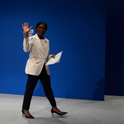The joke is almost as old as the prime minister’s Westminster career, coined first in the late 1990s by fellow frontbenchers scornful of her seeming inability to give a straight answer to a straight question. Her behaviour then was read not just as timidity, but vacuity; proof, especially for male colleagues resentful of her unusually rapid rise to the shadow cabinet, that she was just another token woman promoted out of her depth.
Well, to some extent the joke is now on them. Yet the charge that she doesn’t know her own mind lingers. For months, Whitehall has grumbled under its breath about the difficulty of getting definitive green lights to launch even agreed domestic policies and more urgently about the lack of clear strategic direction from No. 10 over Brexit—concerns made brutally explicit in the recently leaked resignation email from Ivan Rogers, Britain’s departing ambassador to the European Union. In a withering new year profile of the woman it called “Theresa Maybe,” the Economist portrayed her as vacillating helplessly in a vacuum of ideas. Theresa May be moving inexorably towards a hard Brexit; then again, she may not. The same is true of her mission to help the “just about managing,” until more tangible policy details emerge.
As ever when a woman is accused of weakness for not following conventional alpha male leadership patterns, there is a grain of sexism here. Recent history is littered with the corpses of men who arrogantly assumed Theresa May would be a pushover, only to find out that she knows her own mind rather too well. (Not for nothing did Ken Clarke describe her as a “bloody difficult woman”; her favoured negotiating style is simply to grind her opponents down remorselessly.)
Besides, for all the gnomic statements about Brexit meaning Brexit, it is increasingly clear what sort of departure from the EU she wants—one prioritising lower immigration and freedom from the European Court of Justice over economic considerations such as single market membership, while then somehow salvaging the best trading terms compatible with that. It is merely unclear how she hopes to get it, or indeed how a formerly grudging Remainer could come round to such a hardline view.
Yet trying to understand May in ideological terms is part of the problem. The vicar’s daughter is essentially a moralistic politician, driven less by set beliefs than by a personal idea of duty and propriety-—including, in this case, a sense that it would be improper to subvert a democratically expressed will for Brexit. It doesn’t make her indecisive, but it does make her decisions exceptionally hard for others to predict, a task complicated by an almost pathological reluctance to explain herself. Unusually for a politician, Mrs May barely seems to care whether people like or understand her. She approaches press interviews with all the enthusiasm of a soldier under interrogation. In meetings she listens more than she speaks, and restricts any confidences to a tiny circle of trust to reduce gossip and leaks. (Fairly or unfairly, her reliance on co-chiefs of staff Nick Timothy and Fiona Hill, and insistence on filtering everything through them, inflames the civil service suspicions about how she makes her choices, and frustrates officials by slowing decision-making down.)
The prime minister has played things close to her chest over Brexit not to preserve her negotiating hand, or because the minute she gets specific half the Conservative Party will howl betrayal—although both are factors—but because that’s what she is naturally comfortable doing. And it is precisely this inscrutability, this refusal to reveal the gut instincts around which ideological politics revolves, that makes Westminster uneasy. Theresa May, or she may not. Only she really knows the answer for sure.

To find out more about how you can become involved in Prospect’s Trade Challenge programme, please contact david.tl@prospect-magazine.co.uk
You can also receive the full “Brexit Britain: the trade challenge” report as a fully designed PDF document. To do so, simply enter your email below.
[prosform fields="email,forename,surname" signupcode="Trade" countrycode="GB" redirect="brexit-britain-the-trade-challenge-is-yours"]
When you sign up for this free report, you will also join our free Prospect newsletter.
Prospect takes your privacy seriously. We promise never to rent or sell your e-mail address to any third party. You can unsubscribe from the Prospect newsletter at any time













